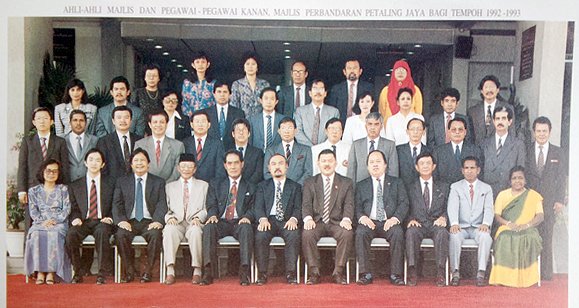MOST ratepayers are unlikely to know this. But according to the Local Government Act, if a local council incurs a debt it cannot pay, ratepayers can be compelled to pay up instead. Section 45 of the Local Government Act states that should the local council default in payment of a loan for three months, the matter can be brought to court. And the High Court can order that rates be imposed on all ratepayers to help pay off the debt.
The issue here is not a hypothetical “what if”. The Petaling Jaya City Council or MBPJ has already been slapped with a lawsuit demanding millions of ringgit in compensation for an alleged deal that went sour. Suffice to say then that it would be prudent for ratepayers to know exactly what decisions councillors make on their behalf. After all, the wrong decisions could lead to a debt that affects ratepayers across the board.
But do ratepayers have enough access to the council’s decision-making? And do ratepayers themselves care to find out?
Annual report

Information on local council decisions is limited. Some councillors even argue that because the public don’t ask for information, it need not be provided.
But the Local Government Act also states that the local council is a body corporate for all ratepayers. Technically, as a body corporate, the MBPJ should be producing annual reports and providing information to the public whether they ask for it or not.
Actually, the council did produce annual reports for ratepayers once upon a time. The last time an annual report was produced, however, was in 1992.

The report had each department list out the problems they were tackling and provided a statement on how these problems would be dealt with. Details like the number of billboards and the expected number of future development projects were stated clearly within the annual report. The report is an important aspect of being transparent that the MBPJ should reinstate.
There is further impetus to make public all contracts that the local council signs. A recent court ruling insists that the government cannot simply slap “sulit” on documents and contracts that are of public interest. And surely, local councils are all about public interest since the entire reason for their existence is to provide public services.
Public demand
Bur regardless of how much some of us in government may demand for some things to be done, they are meaningless if the public does not also push for the same things.
Take for example my previous column about demanding for the local council’s meeting minutes, which the law actually allows for. To date, no one has bothered to test whether they can gain access to the meeting minutes.
What exactly are the people waiting for, I wonder?
Ignorance and apathy about the way things work allows those with ill-intent to dictate the way local government is run, even if it is contrary to public interest. For this reason, as a two-term councillor, I have sought to learn as much as I can about the local council and administrative laws such as the Town and Country Planning Act and the Local Government Act.
My findings and observations here in The Nut Graph may not be sensational. But local council issues and these administrative laws affect our daily lives and the public on a much wider scale than any political scandal. These issues may be mundane compared to the politics of the land, but they clearly deserve as much attention from politicians and the public if our society is to be governed well. ![]()
As the Selangor government has yet to formalise the appointment of councillors for the next one-year term, KW Mak is just another Petaling Jaya ratepayer at the moment. He still does not know how exactly councillors are vetted and chosen.
The Nut Graph needs your support


Ruzaini says
It is an interesting point that you have highlighted above. I reckon that the Local Council is entirely appointed by the government. Hence, there is always the element of political preference and interference.
I have one question. Since the ratepayers do not have any say in the decision-making, and further compounded by the fact that the councillors are not accountable to the ratepayers, could you suggest how we can inquire into their decisions and make the councillors answerable to the ratepayers?
Secondly, to whom should the questions be addressed?
KW Mak says
@ Ruzaini
As there is no system governing what you have asked, I have no official answer to furnish you with. You may approach your local elected representative, who may or may not have a hand in appointing the local councillor.
Alternatively, you could go to the press with your grouses if you want councillors to be answerable, although that suggestion is certainly frowned upon by many councillors I know.
Finally, if that doesn’t work, you may try going directly to the elected representative in charge of the local government portfolio, who is a state executive councillor at the state government level and the housing and local government minister at the federal level.
Regards
ganesh m says
I will make effort to gain access to meeting minutes and update my progress bi-weekly to all Nut Graph readers. Lets see if there’s any difference compared to the previous ruling government.
Ruzaini says
I reckon that it is a good move by you. Thanks in advance for taking the pain to furnish us, the Nut Graph readers, with the information. Together we can set things right, regardless of how small and seemingly insignificant our act would be. Salam Revolusi.
KW Mak says
A little update.
I was made to understand that the MBPJ did produce annual reports up until 2007 in limited quantities and that they were made available to the public if they asked. Those that usually ask for these reports were usually university students however, and not residents. The publication of the annual report stopped in 2008 when Pakatan Rakyat took over however.
Ruzaini says
Thank you for the update.
If i go by with your remark, I take it that for this year, there is no report produced by the MBPJ or any local council for that matter. Is that the case now?
KW Mak says
@ Ruzaini
I can only speak on behalf of MBPJ – which is an affirmative that no annual report was produced for 2009 and 2010 to date.